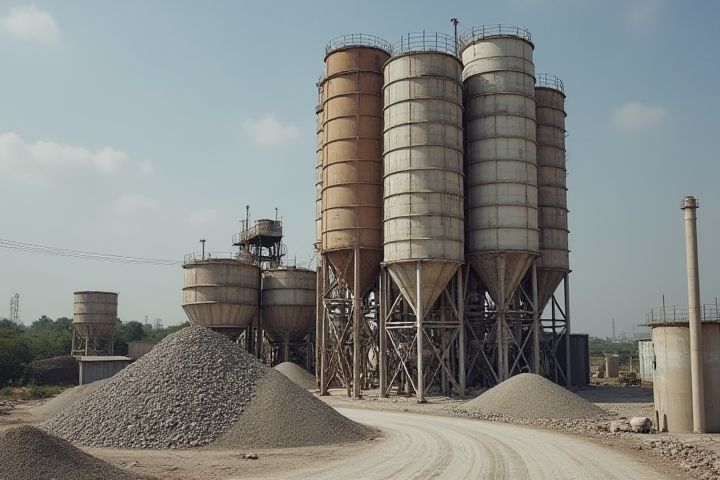
The cement industry in Nigeria is a vital sector contributing significantly to the nation's economy and infrastructure development. With a production capacity exceeding 50 million metric tons per year, Nigeria stands as one of the largest cement producers in Africa. Key players in this industry include companies like Dangote Cement, Lafarge Africa, and BUA Cement, which dominate the market with advanced production technologies and extensive distribution networks. The government's efforts to enhance local production through policies aimed at reducing import dependence have further stimulated growth. As urbanization accelerates in Nigeria, the demand for cement is expected to rise, driving innovation and investment in sustainable practices within this essential industry.
Leading Manufacturers
Nigeria's cement industry is dominated by key players such as Dangote Cement, Lafarge Africa, and BUA Cement, which significantly influence the market landscape. Dangote Cement, recognized as Africa's largest cement producer, boasts a robust production capacity, contributing to infrastructure development across the nation. Lafarge Africa, part of the global LafargeHolcim Group, emphasizes sustainability in its operations while playing a vital role in improving the cement supply chain. BUA Cement, known for its modern manufacturing plants, is rapidly expanding its market share and helping to meet the growing demand for cement in Nigeria's booming construction sector.
Domestic Production Capacity
The cement industry in Nigeria emphasizes enhancing domestic production capacity to meet the growing demand for construction materials. Major players such as Dangote Cement and Lafarge Africa invest heavily in modernizing facilities and expanding their manufacturing plants, which significantly boosts output. This strategic focus not only reduces dependence on imports but also promotes local job creation and economic growth. By prioritizing sustainability and efficient resource management, the sector aims to align with global standards while supporting infrastructural development throughout the nation.
Raw Material Availability
The cement industry in Nigeria heavily relies on the availability of key raw materials such as limestone, clay, and gypsum, which are essential for cement production. With vast reserves of limestone primarily found in the southwestern region, Nigeria boasts significant potential to meet domestic demand and even export opportunities. Strategies aimed at optimizing the extraction and processing of these materials are crucial for enhancing production efficiency and sustainability. As a stakeholder, you can explore partnerships that prioritize local sourcing of these resources to support economic growth and reduce environmental impact.
Government Policies
The cement industry in Nigeria is significantly influenced by government policies aimed at promoting local production and reducing import dependency. Initiatives such as the Economic Recovery and Growth Plan (ERGP) encourage investment in domestic cement manufacturing, providing incentives for infrastructure development. Additionally, regulatory measures like tariffs on imported cement enhance competitiveness for local producers. Your understanding of these policies can help assess their impact on market dynamics and economic growth in the region.
Export Opportunities
The cement industry in Nigeria has increasingly turned its attention to export opportunities, driven by abundant limestone reserves and a growing production capacity. Major companies like Dangote Cement dominate the market, leveraging advanced technology and efficient processes to export high-quality cement to neighboring countries and beyond. This strategic focus not only enhances Nigeria's position in the global cement market but also contributes to economic growth and job creation within the local economy. As a result, you can expect a significant rise in foreign exchange earnings, ultimately boosting national revenue and infrastructure development.
Infrastructure Development
The cement industry in Nigeria plays a pivotal role in the nation's infrastructure development, contributing significantly to construction projects, such as roads, bridges, and residential buildings. Major companies, including Dangote Cement and Lafarge Africa, are strategically investing in production facilities to increase capacity and meet the growing demand for quality cement. The government's push for economic diversification and improved infrastructure has further stimulated growth in this sector, leading to job creation and enhanced local economies. As demand for sustainable construction practices increases, Nigerian cement manufacturers are also exploring eco-friendly alternatives and technologies to reduce their carbon footprint.
Energy Consumption
The Nigerian cement industry is increasingly prioritizing energy consumption efficiency to reduce operational costs and environmental impact. With the country's growing demand for cement, manufacturers are investing in alternative energy sources, such as natural gas and biomass, aiming to lower carbon emissions and fuel costs. Various companies are adopting state-of-the-art technologies that enhance energy efficiency in production processes, thus optimizing resource utilization. By focusing on sustainable practices, the industry not only aligns with global climate goals but also strengthens its competitive edge in the market.
Environmental Regulations
The cement industry in Nigeria is increasingly prioritizing environmental regulations to mitigate its ecological impact. Companies are adopting sustainable practices, such as utilizing alternative raw materials and implementing energy-efficient technologies, to reduce carbon emissions. The Nigerian government's policies, including stringent emission standards and waste management protocols, are shaping industry practices and encouraging investment in green solutions. By embracing these regulations, businesses not only comply with legal requirements but also contribute to a more sustainable future for Nigeria's environment.
Technological Advancements
The cement industry in Nigeria is increasingly incorporating technological advancements to enhance production efficiency and sustainability. Innovations such as automated manufacturing processes and real-time data analytics improve quality control and resource management. Additionally, the adoption of alternative fuels and eco-friendly materials significantly reduces carbon emissions, aligning the sector with global environmental standards. By investing in cutting-edge technology, Nigerian cement manufacturers can not only meet local demand but also compete effectively in the international market.
Market Competition
The Nigerian cement industry is characterized by intense market competition, driven by local and international players striving to capture significant market shares. Major companies such as Dangote Cement, Lafarge Africa, and BUA Cement continually innovate and improve production processes to meet the growing demand for high-quality cement. With the ongoing infrastructure development in Nigeria, these companies are expanding their distribution networks to ensure product availability across various regions. As a consumer, you benefit from the competitive pricing and diverse product offerings as these firms strive to enhance customer satisfaction and drive economic growth.
